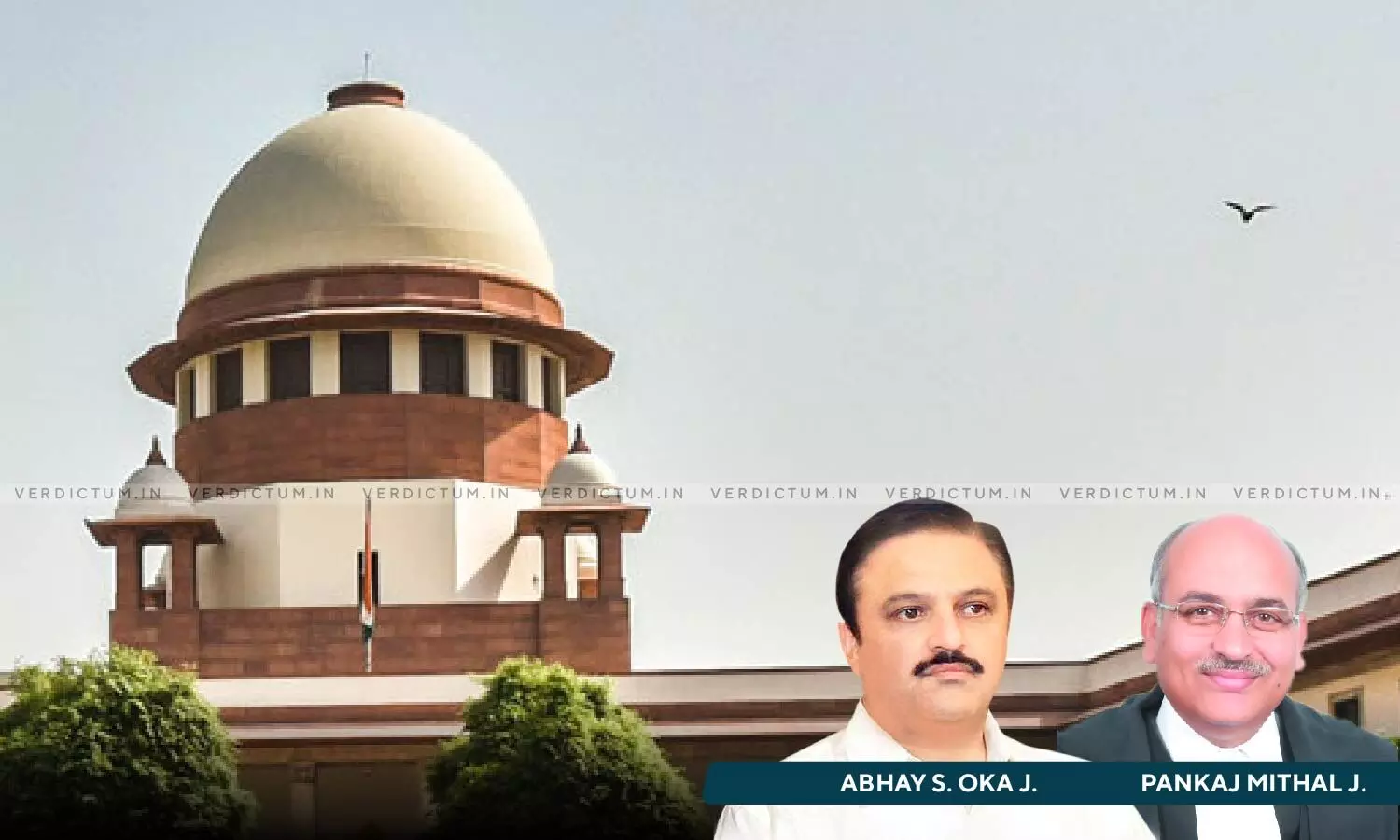
PMLA| Section 120B IPC Becomes A Scheduled Offence Only If Conspiracy Alleged Is Of Committing A Scheduled Offence: Supreme Court
 |
|The Supreme Court has held that an offence of criminal conspiracy punishable under Section 120B IPC will become a scheduled offence under Prevention of Money Laundering Act only if the conspiracy alleged is of committing an offence which is specifically included in its Schedule.
The Court rejected the contention raised by ED that as Section 120B of IPC is included in Part A to the Schedule, even if the allegation is of making a criminal conspiracy to commit an offence which is not a part of the Schedule, the offence becomes a scheduled offence.
The Court held thus in an appeal filed by an accused against the Karnataka High Court judgment that refused to quash the complaint filed by Directorate of Enforcement (ED).
The two-Judge Bench comprising Justice Abhay S. Oka and Justice Pankaj Mithal observed, “It cannot be the legislature's intention to make every offence not included in the Schedule a scheduled offence by applying Section 120-B. Therefore, in our view, the offence under Section 120-B of IPC included in Part A of the Schedule will become a scheduled offence only if the criminal conspiracy is to commit any offence already included in Parts A, B or C of the Schedule. In other words, an offence punishable under Section 120-B of IPC will become a scheduled offence only if the conspiracy alleged is of committing an offence which is otherwise a scheduled offence.”
Senior Advocate Meenakshi Arora appeared for the appellant while Additional Solicitor General S.V. Raju appeared for the respondent.
Brief Facts -
In the year 2011, Alliance Business School (ABS) purchased a property for the consideration of Rs. 13.05 crores and in 2013, the appellant had purchased the said property from ABS via a registered sale deed for the same consideration. Thereafter, she purchased second property in 2019. The appellant’s husband was the Vice Chancellor of the Alliance University and then an FIR was registered against an accused no. 1 alleging that he collected a sum of Rs. 107 crores from the students claiming himself as the Chancellor of the University.
In 2021, the ED passed an order under Section 5 of the PMLA and it was alleged that the appellant entered into a conspiracy with the accused no. 1. The Special Court took cognizance of the complaint filed against the appellant and he filed a petition before the Karnataka High Court under Section 482 of the Criminal Procedure Code (CrPC) seeking relief of quashing the said complaint. However, the said petition was dismissed by the Court. Hence, the matter was before the Apex Court.
The Supreme Court in view of the aforementioned facts noted, “While giving effect to the legislature's intention, if two reasonable interpretations can be given to a particular provision of a penal statute, the Court should generally adopt the interpretation that avoids the imposition of penal consequences. In other words, a more lenient interpretation of the two needs to be adopted.”
The Court further noted that the legislative intent which can be gathered from the definition of the scheduled offence under clause (y) of sub-Section (1) of Section 2 of the PMLA is that every crime which may generate proceeds of crime need not be a scheduled offence and therefore, only certain specific offences have been included in the Schedule.
“If we look at Section 120-B, only because there is a conspiracy to commit an offence, the same does not become an aggravated offence. The object is to punish those involved in conspiracy to commit a crime, though they may not have committed any overt act that constitutes the offence. Conspiracy is an agreement between the accused to commit an offence. If we look at the punishments provided under Section 120¬B, it becomes evident that it is not an aggravated offence. It only incorporates the principle of vicarious liability. If no specific punishment is provided in the Statute for conspiracy to commit a particular offence, Section 120¬B treats a conspirator of the main accused as an abettor for the purposes of imposing the punishment”, observed the Court.
The Court said that the interpretation suggested by the ED will defeat the legislative object of making only a few selected offences as scheduled offences and if such an interpretation is accepted, the statute may attract the vice of unconstitutionality for being manifestly arbitrary. Therefore, the Court concluded that it is not necessary that a person against whom the offence under Section 3 of the PMLA is alleged, must have been shown as the accused in the scheduled offence.
“Even if an accused shown in the complaint under the PMLA is not an accused in the scheduled offence, he will benefit from the acquittal of all the accused in the scheduled offence or discharge of all the accused in the scheduled offence. Similarly, he will get the benefit of the order of quashing the proceedings of the scheduled offence”, added the Court.
The Court also said that the issue of whether the appellant has used tainted money forming part of the proceeds of crime for acquiring the second property can be decided only at the time of trial.
Accordingly, the Apex Court allowed the appeal and quashed the impugned order.
Cause Title- Pavana Dibbur v. The Directorate of Enforcement (Neutral Citation: 2023 INSC 1029)